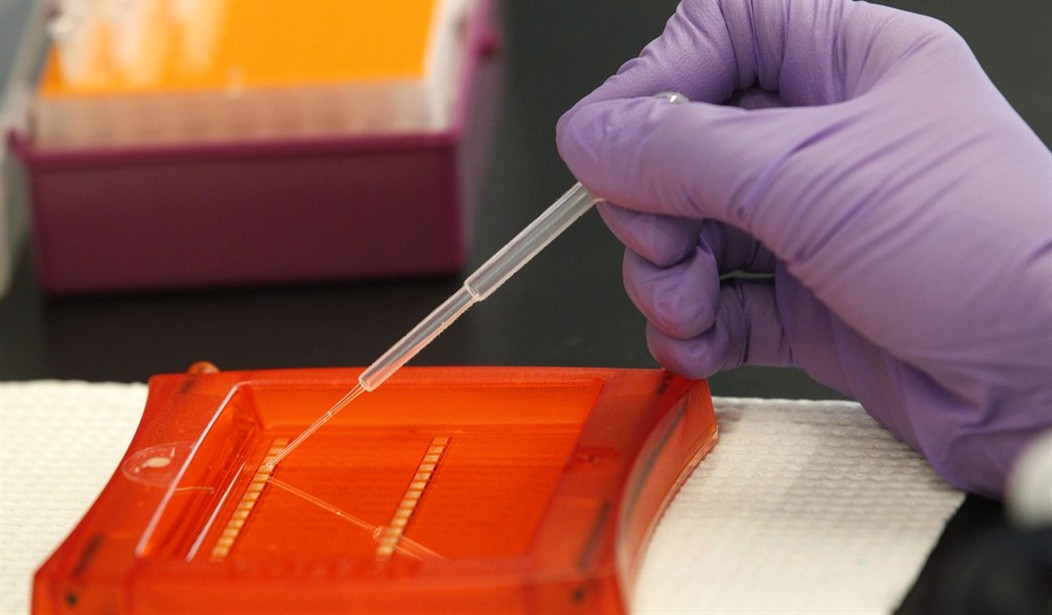More scientific progress? In the wake of news videos about slicing up and testing the remains of aborted babies, leave it to leading scientific researchers to continue to push the envelope. The Hinxton group (a group of stem cell researchers, policy wonks, and bioethicists) is calling for reopening the debate over altering the DNA of embryos. They stop short of advocating tweaking children before birth, but only just barely. In fact, scientist and Hinxton member Robin Lovell-Badge argued for allowing even this direct genetic tinkering with our children:
“By [banning genetic modification], you make people who are doing stuff that’s relevant, do so behind closed doors.... You could think about making disease resistance for a variety of infectious diseases, even influenza.... When you talk to people and say, ‘Would you like to have children who are resistant to a range of different diseases,’ most people would think, ‘Well maybe that’s not such a bad idea.’ That’s the acceptable form of enhancement.”
If that justification sounds creepily familiar to you, you're not alone. It's the primary terror in the 1997 dystopian movie Gattaca - one of a host of other horror stories revolving around genetic manipulation. A quote from Gattaca’s geneticist when talking to new parents:
"We want to give your child the best possible start. Believe me, we have enough imperfection built in already. Your child doesn't need any more additional burdens. Keep in mind, this child is still you. Simply, the best, of you. You could conceive naturally a thousand times and never get such a result."
This kind of DNA editing is banned or highly restricted in much of the developed world. And for good reason: it invests incredible power in the hands of scientists and raises significant ethical questions about how DNA manipulation affects human nature and human dignity.
Of course, many scientists see no real problem with this, and they are aided by our lackadaisical culture. We have granted our scientists god-like status and have abdicated our moral responsibility to their expertise. It's simply too much work for the modern American to care about moral questions when it comes to technological development.
Thankfully, some scientists are pushing back - at least for now. A U.S. group states:
"In our view, genome editing in human embryos using current technologies could have unpredictable effects on future generations. This makes it dangerous and ethically unacceptable. Such research could be exploited for non-therapeutic modifications."
But even implied by this quote (and made quite explicit in the quote from Lovell-Badge) is the assumption that the manipulation of human DNA is ethical so long as it achieves positive, predictable therapeutic results. If it provides "cures" or guards against undesirable problems, then it's golden. The typical argument is simple: 1. It's going to happen anyway, so you might as well legalize and regulate it, and 2. If it provides any positive tangible human benefit, we should legalize and subsidize it and not question what happened in the research lab to produce it.
Utilitarianism reigns, and too many Americans don't think twice about it, which is highly ironic, given the popularity of dystopian movies and books in recent years. Maybe a younger population fed a steady diet of distrust will grow to at least ask the scientific community hard questions. Or maybe we'll just continue to lap up the "cures" and turn a blind eye to the underlying problems.
I'll leave you with a classic line from Jurassic Park. In response to John Hammond’s spirited defense of his dinosaur project and the scientific achievements attained by his scientists, Dr. Malcolm replies: "Yeah, yeah, but your scientists were so preoccupied with whether or not they could that they didn't stop to think if they should." It's remarkable that a culture obsessed with science fiction, dystopian survival dramas, Big Brother conspiracy thrillers and the like is so apathetic towards the actions of a scientific community that increasingly disregards basic questions of human ethics.
Scientific Moral Regress
The opinions expressed by columnists are their own and do not necessarily represent the views of Townhall.com.

Advertisement
Recommended
Trending on Townhall Videos
Advertisement
Advertisement
Advertisement
























Join the conversation as a VIP Member